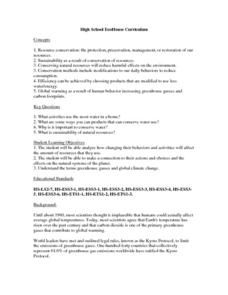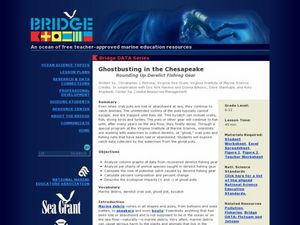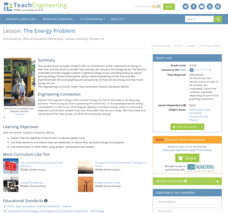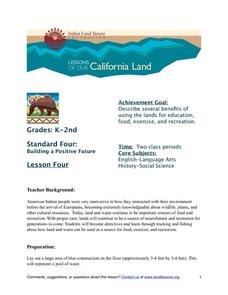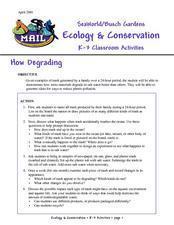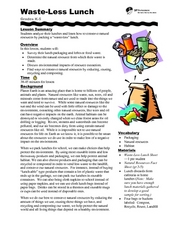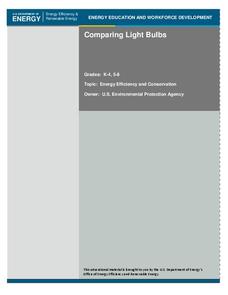Wild BC
Climate Change Bingo
Here is a 20-box bingo card to use when exploring ways that humans impact the environment. Various environmentally aware activities are listed in the boxes, and learners circulate the room to find someone who practices the different...
Texas State Energy Conservation Office
Cost-Effective Buying
Middle school energy experts read about the relationship between energy use and cost-efficiency. Then they work through a couple of scenarios to determine which approach is more cost-effective.
Curated OER
High School EcoHouse Curriculum
How has the level of carbon dioxide changed over recent years, and what is contributing it? Groups work together to research and present their findings in a creative way. Also built into the lesson is a visit to a sustainable house, but...
PricewaterhouseCoopers
Conservation: Water
Here is a fantastic experiment-based lesson on water conservation, waste, and filtration. The lesson plan is well-developed and provides background information, discussion leads, and six scripted lab activities anyone can do. The class...
Curated OER
Ghostbusting in the Chesapeake
Ghost pots, fishing gear lost during crabbing expeditions, continue to trap crabs that are never collected. Increase your budding ecologists' awareness of human impact on the environment as well as conservation efforts using this...
Curated OER
Exploring a Teaching Career Through an Energy Lesson
After learning how to dentify information on energy and its conservation. your class can work in groups to create an activity and lesson plan for elementary students, teaching all about energy and its conservation. Students demonstrate...
Teach Engineering
The Energy Problem
Think you can solve the energy problem? You'll first need to know about current energy use. Analyzing a set of circle graphs lets scholars see where energy consumption is the greatest, both by sector and by household use. They develop a...
National Park Service
Reduce Our Carbon Footprint, Let’s Compost!
Roll up your sleeves and get a little dirty with this elementary and middle school compost lesson. All you need is a large plastic container, a couple old newspapers, some organic waste, and a few hundred worms and you're ready to start...
National Park Service
What Can We Do?
Motivate young conservationists to stand up and make a change. After learning about the efforts in Cascade Nation Park to reduce carbon emissions in order to preserve the wilderness, students work in groups creating action plans for...
Polar Bears International
Taking Action!
Motivate young scientists to stand up and take action with this environmental science instructional activity. To begin, the class works in small groups brainstorming actions that support the conservation of the earth before creating and...
May Media Group
Treatment Plants
Young scientists explore nature's water treatment plants in this simple science demonstration. By placing a stalk of celery in a cup of water mixed with food coloring, children are able to observe how plants absorb nutrients and...
Berkshire Museum
Reduce, Reuse, and Recycle: Sorting Through Personal Choices
Raise children's awareness about the importance of conservation with this hands-on science lesson plan. Start by breaking the class into groups and having them collect trash from around the school or local park. Students then use the...
Indian Land Tenure Foundation
Gifts from Land and Water
With a series of fun hands-on simulations, young children can learn about conservation and natural resources. Your learners become land detectives, discussing and investigating the gifts that the land and water provide them. They then...
Indian Land Tenure Foundation
Sharing Resources: The Nuts Game
The land has always provided its inhabitants with resources that allow them to survive. However, sometimes resources run scarce and sharing becomes an important task. Help little ones understand why and how people have shared resources...
SeaWorld
Ecology & Conservation
How much trash does an average family produce in 24 hours? Where does that trash end up? Get your youngsters thinking about ecology and conservation as they discuss the impact pollution has on the marine environment. After a deep...
SF Environment
Waste-Less Lunch
Is it possible to have a waste-less lunch? Can your class become leaders in conservation? Discuss the importance of reducing waste during lunch time with a fun lesson that can be extended to everyday practices. First the class examines...
Florida Department of Environmental Protection
Water, Water Everywhere
Water is one of the most precious resources on the earth. Explore water conservation, the importance of natural resources, and how water is used throughout the globe. Two complete activities along with discussion questions are used to...
Earth Day Network
Healthy Earth, Sick Earth
Earth is sick and needs our help! Read the children's book Planet Earth Gets Well to explain the various problems facing the planet, discussing what young conservationists can do to heal the planet along the way. A great Earth Day...
Scholastic
Study Jams! Changes in Ecosystems
Our scholarly friends head to the lake to go fishing and are unpleasantly surprised by the algae filling the water. They talk about primary and secondary succession as different ways that ecosystems are changed. Show the short video,...
Curated OER
“THE LORAX” by Dr. Seuss
Few children's books convey the message of conservation as well as Dr. Seuss' The Lorax. Read the story aloud, emphasizing the interconnectedness of plants and animals in an ecosystem and discussing different ways people can help the...
Curated OER
Comparing Light Bulbs
An average home produces twice as many emissions as an average car. Teach your class how to reduce energy consumption by replacing standard incandescent light bulbs with compact fluorescent light bulbs. Perform an experiment to compare...
SF Environment
Sort and Color!
Sorting is a very important skill that can be used in math and even science. Learners get familiar with some environmentally friendly vocabulary terms as they practice separating objects that can be recycled from those that can't. They...
Baylor College
How Do We Use Water?
Send youngsters home to survey how they use water in their homes. Then bring them together to discuss which uses are essential for our health and which are not. A helpful video offers teaching tips for this lesson plan, and a...
Polar Trec
What Is My Footprint?
How do one's habits and lifestyle choices affect the environment? Through a short online survey, learners will calculate their own carbon footprints then determine how to reduce their impact on the environment through simple steps, such...




